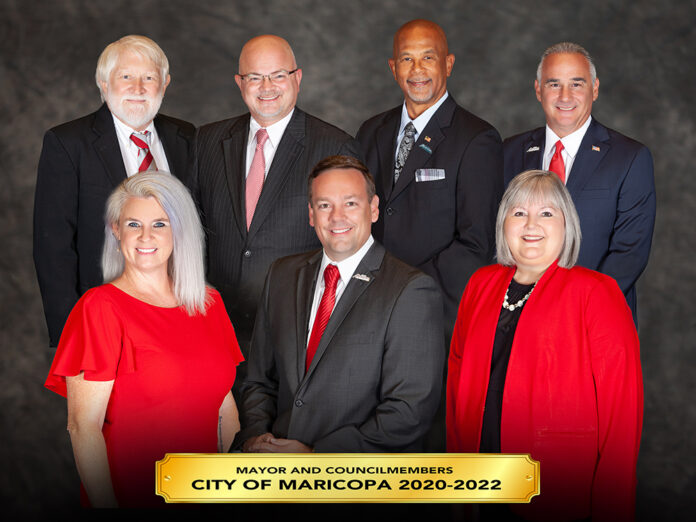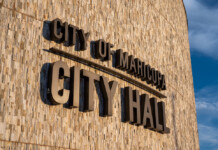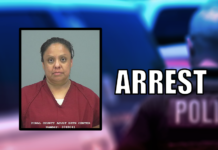
The issue of legalized recreational marijuana in Maricopa has ignited passions on many fronts. To find out where our city leaders stand on the issue, InMaricopa reached out to the mayor, vice mayor and all five members of Maricopa city council to get responses to three clarifying questions about recreational marijuana and a related ordinance passed by the council in a 6-1 vote on Feb. 16. Councilmember Vincent Manfredi voted against.
SOME BACKGROUND FIRST
A number of councilmembers have said they voted to get a city ordinance on the books before the state enacts its own policies, expected this month. Without their own ordinance in place before the state law takes effect, cities must follow the state law.
The ordinance prohibits recreational marijuana dispensaries in the city unless they are part of a dual-license facility permitted to sell medical cannabis, which constitutes an effective ban on recreational marijuana in the city. When coupled with the city’s restrictive code governing medical marijuana facilities, it would be highly unlikely that a dispensary could operate profitably here in town.
The state has approved licenses for 86 recreational marijuana dispensaries, including three in Pinal County: two in Apache Junction and one in Casa Grande.
Maricopa does not have a medical marijuana dispensary. The city code only allows medical marijuana facilities performing certain functions to operate within specific zoning areas. In areas zoned general commercial, for example, dispensaries may operate but not cultivation facilities. Areas zoned for light and general industrial uses may have only infusion or cultivation facilities.
The city ordinance for marijuana-related businesses includes many restrictions on permitted locations. Medical marijuana uses of any kind may not be located within 250 feet of a residentially zoned property, for example. They also may not be located within 500 feet of any of the following:
• another dispensary
• an abuse treatment facility
• group or residential care home
• transitional and supportive housing facility
• alcohol rehabilitation facility
• correctional transitional facility
• public or private elementary or secondary school, kindergarten, or preschool
• day care center or similar use; parks and recreational facility
• civic facility
• religious facility
No alcohol may be sold or distributed on the premises of a marijuana facility, and the facility may only operate from 8 a.m. to 10 p.m. The dispensary may not have a drive-through facility, and a medical marijuana dispensary cannot be larger than 2,500 square feet, with a storage area no larger than 500 square feet. A cultivation facility cannot be larger than 3,000 square feet, with no more than 1,000 square feet of storage.
A Transportation Corridor (TC) zoning overlay further restricts the areas in which a dispensary may operate, prohibiting any marijuana facility from operating within the first 150 feet of applicable parcels fronting State Routes 347 and 238, and Maricopa-Casa Grande Highway.
QUESTIONS AND RESPONSES
City council will review options and potential changes to the recreational marijuana ordinance in a work session on Tuesday, April 6, from 5 to 7 p.m. at city hall. The session is open to the public and participation is encouraged.
Here are the responses of councilmembers who replied to our questions. All were given the opportunity to respond; some chose to answer all three questions, some just one. Six of the seven provided InMaricopa with a response; Councilmember Bob Marsh chose not to respond.
Q: Please explain why you supported or opposed the dual-license restriction on potential recreational marijuana dispensaries in Maricopa.
Mayor Christian Price: For me at this time, this was a sub-issue of the real issue at hand: Which was to get an ordinance in place that according to the proposition allows cities/towns/counties to do, then they can have a say in what the community really wants. Thus, allowing the appropriate time to deal with the many legal nuances of the law and fully include our residents in the discussion. Without this we would not have been able to come back at a later time (hoping for the next 60-90 days) and to engage the community, to hear all sides of the issue, while understanding more fully what the law allows & disallows. The very request of us to further answer these clarifying questions about what was done at (the Feb. 16) city council meeting further indicates that many in our community don’t fully understand the law either, which is what we’re trying to solve with more time to discuss & review it in-depth. I also do believe that we will further dissect the issue of dual licensed vs. stand alone in our future discussions.”
Vice Mayor Nancy Smith: What I believe would be the most beneficial to your readers is to watch the meeting video. The answers to your and their questions are all in the video. (In addition to the response above, Smith submitted a letter to the editor of InMaricopa outlining her position on the issue.)
Councilmember Amber Liermann: I am working toward finding the balance of limited government and protecting the rights of community members who want to participate in the decisions surrounding this issue. I look forward to continued discussions and input from community members regarding this topic.
Councilmember Vincent Manfredi: I am a free-market proponent and think it’s wrong to deny a business the opportunity regardless of how I feel about marijuana, to open if done legally. Some will say the vote allowed a dispensary to come here, but that is only if they open a medical nonprofit dispensary first and then a recreational one. To me that is like saying if you want to open a store that sells Bayer aspirin and Tylenol, you first need to get a pharmacy license, even if you have zero desire to sell prescription drugs. The ordinance council passed required someone to open a different business first to be able to open the one they want. How is personal freedom? Imagine telling a cupcake baker they can open a cupcake store only if they first open a non-profit bread factory.
Councilmember Rich Vitiello: Maricopa City Council and staff are looking into the state mandates prior to the approval or disapproval. This will give us more time to work out all the details and hear from the public within the next 60 to 90 days.
Councilmember Henry Wade: I did not oppose it. I see this as a business opportunity where costs are more extensive due to the nature of the investment. In other words, the owner would have to support dual entities.
Q: Since there are currently no available medical marijuana licenses in Pinal County, and it is highly unlikely a dual-registered dispensary would move to Maricopa and deal with existing restrictions, doesn’t the dual-license requirement effectively prevent a dispensary from coming to Maricopa at this time?
Price: No, not at all, a dual-licensed dispensary could locate here if they so choose. But remember, recently there was a medical marijuana dispensary just outside of our city limits within the county and they chose to leave for greener pastures in a more populous area of the Phoenix metro area. So that would be a business decision any relocating dispensary would have to make for themselves that would most likely be driven by population numbers and their own business formula for success.”
Manfredi: Yes, it penalizes an entrepreneur who does not want a medical dispensary, and only wants to open a recreational one. It is picking and choosing winners based on if they can afford both.
Wade: As I stated in the first question, the opportunity is available for a businessperson to decide if it makes sense for his/her model.
Q: As you all know, every precinct in the city voted to approve recreational marijuana in the November election, so there is obvious support for it in the city. Would you commit to holding public hearings on the issue? In what time frame?
Price: Yes, I have been asking for this for since the City Council’s Futures Planning retreat. (At the Feb. 16 meeting) from the dais I repeated my call and our staff answered by saying they would be researching best practices from other cities and towns and counties, both locally and from around the country. When this information is ready, they will be bringing it back to us. I’m hoping for the next 60-90 days to begin these community discussions.”
Manfredi: I think we should hold a public meeting next month or sooner. The worry I have is at the council meeting (on Feb. 16) only 2-3 people showed up, so how much time do you dedicate to something with very little community participation? Please keep emailing your council members at [email protected] and let them know how you feel.
Wade: I believe the people have spoken, now let’s let the economic development and zoning process take it to the next level. Let’s start now if someone wants to take it on.
Councilmember Vincent Manfredi is minority owner of InMaricopa.


![Alleged car thief released without charges Phoenix police stop a stolen vehicle on April 20, 2024. [Facebook]](https://www.inmaricopa.com/wp-content/uploads/2024/04/IMG_5040-218x150.jpg)
![Locals find zen with Earth Day drum circle Lizz Fiedorczyk instructs a drum circle at Maricopa Community Center April 22, 2024. [Brian Petersheim Jr.]](https://www.inmaricopa.com/wp-content/uploads/2024/04/PJ_3922-Enhanced-NR-218x150.jpg)










![Alleged car thief released without charges Phoenix police stop a stolen vehicle on April 20, 2024. [Facebook]](https://www.inmaricopa.com/wp-content/uploads/2024/04/IMG_5040-100x70.jpg)
![Locals find zen with Earth Day drum circle Lizz Fiedorczyk instructs a drum circle at Maricopa Community Center April 22, 2024. [Brian Petersheim Jr.]](https://www.inmaricopa.com/wp-content/uploads/2024/04/PJ_3922-Enhanced-NR-100x70.jpg)
